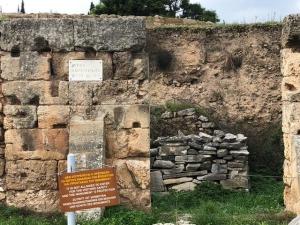
Scripture: Haggai, chapters 1-2; Psalm 129; Luke, chapter 10
Haggai 1:1-9 (NASB) – In the second year of Darius the king, on the first day of the sixth month, the word of the Lord came by the prophet Haggai to Zerubbabel the son of Shealtiel, governor of Judah, and to Joshua the son of Jehozadak, the high priest, saying, “This is what the Lord of armies says: ‘This people says, “The time has not come, the time for the house of the Lord to be rebuilt.”’
Then the word of the Lord came by Haggai the prophet, saying, “Is it time for you yourselves to live in your paneled houses while this house remains desolate?”
Now then, the Lord of armies says this: “Consider your ways! You have sown much, only to harvest little; you eat, but there is not enough to be satisfied; you drink, but there is not enough to become drunk; you put on clothing, but there is not enough for anyone to get warm; and the one who earns, earns wages to put into a money bag full of holes.”
The Lord of armies says this: “Consider your ways! Go up to the mountains, bring wood, and rebuild the temple, that I may be pleased with it and be honored,” says the Lord. “You start an ambitious project, but behold, it comes to little; when you bring it home, I blow it away. Why?” declares the Lord of armies. “It is because of My house which remains desolate, while each of you runs to his own house.”
Observations: Malachi 3 is probably the best-known passage which talks about faithfulness and obedience in terms of our finances. In my experience, I’ve heard far more sermons on Malachi 3 than I have on this passage from Haggai 1. But as I read this passage today, a couple of things came to my mind. First, God is as direct in this passage as in Malachi. In Malachi, the people were bringing substandard sacrifices, and failing to pay the tithe that God commands. Here in Haggai, the people were not attending to the Temple. God called the people to rebuild the Temple, but the people said, The time has not come, the time for the house of the Lord to be rebuilt.
Haggai does not go into detail about the peoples’ reasons for saying that. Perhaps they were concerned about the political ramifications. Maybe they just didn’t think they could afford it. Perhaps they had too many other things going on – they were too busy. Whatever the reason, God wasn’t buying it.
Consider your ways! Twice in these verses God issues this warning to the people. “Think about what you’re doing!” The first time God says that, he connects it with their circumstances. You have sown much, only to harvest little; you eat, but there is not enough to be satisfied… God seems to say: “Do you want to use your ‘poverty’ as an excuse? The reason that you’re ‘poor’ is because you’re not honoring Me!” This is the “other side” of the promise in Malachi 3 that if the people would honor God with tithes and offerings, he would pour out such a great blessing that they wouldn’t be able to contain it.
But God’s message is not limited to giving. Again he says, Consider your ways! You start an ambitious project, but behold, it comes to little; when you bring it home, I blow it away. Why? It is because of My house which remains desolate, while each of you runs to his own house. “Desolate” is the Hebrew word harab, which means to be destroyed or to dry up. It is the same word that Ezekiel uses in Ezekiel 26.19 to describe “the cities which are not inhabited.”
In other words, “desolate” can mean both “destroyed” and “deserted.” I believe that God is concerned about both. He doesn’t want his “house” – the Temple – to be destroyed, or to fall apart in disrepair. The people were called to rebuild it, and God wants them to get to it! But He also doesn’t want His house to be empty; his house was vacant, while each of you runs to his own house. He wants His house to be taken care of, and He wants His people to be there.
Consider your ways!
Application: I think God is reminding us about another aspect of our covenant relationship with Him. People often focus on the financial side of things, looking for reasons to not honor God with tithes and offerings. I’ve heard plenty of arguments about tithing being an “Old Testament concept,” but when Jesus said that we are to seek first God’s Kingdom and His righteousness, I believe He expected surrender of our finances as well as our will. In fact, that passage (Matthew 6) includes Jesus telling us not to worry about what we’re going to eat, drink, or wear. We must submit to God in every part of our lives, or we’re not really surrendered to Him at all.
Beyond the financial aspect, however, God’s call for His house to not be left “desolate” is also a reminder of His desire for His people to come to His house for worship. It means something for God’s people to “meet together” (Hebrews 10:25). If everyone is off worshiping God in his or her own way, isn’t that similar to each of you runs to his own house?
The call from God to His people today is the same as it was in Haggai’s day: Consider your ways!
Prayer: Father, thank you for reminding us that You are not primarily looking for acts of obedience. Instead, You long for us to respond to You with loving surrender in every part of our lives. You know the areas where each of us is susceptible to Satan’s deception. Thank You for the promises of Your word that when we obey You, you supply all that we need – and more. Help us to consider our ways, and to live each day in complete submission and obedience to You. Amen.












